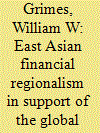|
|
|
Sort Order |
|
|
|
Items / Page
|
|
|
|
|
|
|
| Srl | Item |
| 1 |
ID:
075471


|
|
|
|
|
| Publication |
2006.
|
| Summary/Abstract |
East Asian financial regionalism has advanced significantly since the rejection of Japan 's Asian Monetary Fund proposal in 1997. Key ASEAN+3 initiatives include the Chiang Mai Initiative, which is designed to provide emergency liquidity to economies experiencing currency crisis, and the Asian Bond Market Initiative, which seeks to develop regional bond markets. Surprisingly, these initiatives-despite the assertive "regionalist" rhetoric that has surrounded them and their intellectual origins in the analysis of the 1997-1998 Asian financial crisis-are explicitly designed to complement existing features of the global financial architecture, including IMF conditionality and global financial standards. The nesting of East Asian financial regionalism within the global financial architecture results from the political-economic interests of the leading economies of the region. In the absence of a major change in the political-economic environment, nesting is a stable equilibrium and is unlikely to change.
|
|
|
|
|
|
|
|
|
|
|
|
|
|
|
|
| 2 |
ID:
106004


|
|
|
|
|
| Publication |
2011.
|
| Summary/Abstract |
The global financial crisis of 2008-09 presented a critical challenge to East Asian regional financial cooperation. Over a decade of efforts to reduce regional vulnerability to financial crisis and contagion were confronted with the worst global economic crisis since the 1930s. The results for East Asia were mixed. On the one hand, no economies were forced to submit to IMF-led bailouts, as had happened so painfully in 1997-98. On the other hand, the most highly-developed component of the project of ASEAN+3 financial regionalism - the Chiang Mai Initiative (CMI), which set up a system of emergency liquidity provision - appeared irrelevant, as the central banks of South Korea and Singapore prioritized the establishment of new swap agreements with the United States as a means of ensuring dollar liquidity instead of relying on their Chiang Mai partners. Nonetheless, in May 2009, the ASEAN+3 finance ministers agreed to a substantial expansion and 'multilateralization' of the initiative. This paper critically addresses whether CMI has been transformed into an 'Asian Monetary Fund' and argues that the events of 2008-10 make substantial additional movement in that direction unlikely.
|
|
|
|
|
|
|
|
|
|
|
|
|
|
|
|
| 3 |
ID:
189482


|
|
|
|
|
| Summary/Abstract |
In the wake of the Asian Financial Crisis, East Asia’s efforts to enhance regional financial cooperation raised the possibility of East Asia playing a more assertive role in global financial governance. However, despite the region’s increased voice in governance and economic weight, East Asian financial systems and markets have mostly adapted to global norms developed in New York, London, and Washington, DC. We argue that the failure of East Asia to push an alternative vision of financial governance reflects both the lack of regional political unity and, more crucially, the divisions of interests both between and within key East Asian economies. Despite nearly universal regional dissatisfaction with global standards and institutions in the wake of the Asian Financial Crisis, these two factors have combined to prevent the development of a distinctive regional model that could be promoted at the global level.
|
|
|
|
|
|
|
|
|
|
|
|
|
|
|
|
| 4 |
ID:
174653


|
|
|
|
|
| Summary/Abstract |
Since the 1997 Asian financial crisis, East Asia’s ASEAN+3 states have built the second-largest regional emergency liquidity fund in the world, the Chiang Mai Initiative Multilateralization (CMIM). With a total commitment of $ 240 billion to aid member states facing a currency crisis, CMIM can provide more funds to members than the International Monetary Fund (IMF). Nonetheless, CMIM continues to be functionally subordinate to IMF decisions. This may now be changing following the 2011 creation of the ASEAN+3 Macroeconomic Research Office (AMRO) as a regional mechanism to manage surveillance and design of CMIM lending programs. The ability to delegate surveillance and program design to an independent body is a crucial prerequisite to ending CMIM’s subordination to the IMF, and AMRO seeks to ensure such autonomy through its institutional design. This article analyzes AMRO’s progress toward autonomy, using indicators of effective delegation drawn from organizational theory and newly available information and data on AMRO.
|
|
|
|
|
|
|
|
|
|
|
|
|
|
|
|
| 5 |
ID:
061889


|
|
|
| 6 |
ID:
092146


|
|
|
|
|
| Publication |
2009.
|
| Summary/Abstract |
In the face of the global economic crisis of 2008-09, Japan has played a positive role in helping to stabilize the regional and global financial systems. Among the positive actions it has taken have been large-scale fiscal and monetary stimulus at home, an unprecedentedly large loan to the International Monetary Fund, liquidity support to South Korea, and a proactive role in G-20 discussions. However, regional arrangements such as the Chiang Mai Initiative have been of minimal importance in preventing financial crises in East Asia. Japan can continue to demonstrate leadership in promoting regional economies and financial systems by expanding its current activities, while ensuring that regional arrangements continue to support global ones.
|
|
|
|
|
|
|
|
|
|
|
|
|
|
|
|
|
|
|
|
|